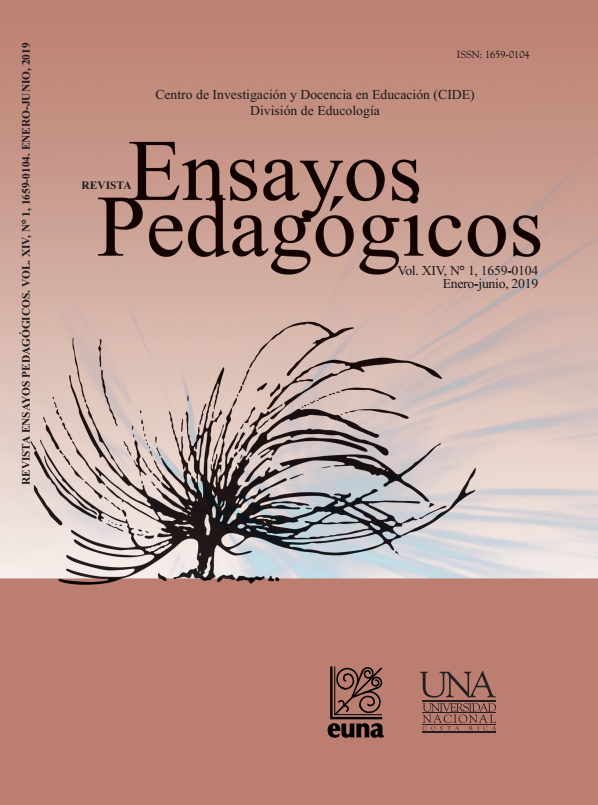Learning Theories and their Relation to Costa Rican Environmental Education
DOI:
https://doi.org/10.15359/rep.14-1.8Keywords:
environmental education, learning theories, natural resource managementAbstract
For many years, improving the educational experience to have better pedagogical transposition in teaching and learning processes has been sought. This led to the development of various theories of learning, including behaviorism, cognitivism, constructivism, socio-constructivism and conectivism. Each of them, based on its epistemology, fosters the development of teaching and learning process in a specialized manner. The objective of this analysis is centered on a description of learning theories and how they relate to environmental education in the Costa Rican Educational system. Through bibliographic study and the analysis of some socio-environmental educational activities, the use of these theories was related to the development of diverse skills focused on promoting the importance of natural resources and the conservation of these for their rational use by future generations.
References
Alonso, C. (2008). Estilos de aprendizaje. Presente y futuro. Journal of Learning Styles, 1(1). 45-63.
Altamirano, A. y Salinas, Z. (2016). La práctica dicente-investigativa desde la tecnología educativa y el socioconstructivismo [The researching practice of learners based on educational technology and socio-constructivism]. Ciencia Unemi, 9(17), 118-1124.
Aparicio, J., Rodríguez, C., Beltrán, J. y Sampedro, L. (2014). Transversalidad del eje medio ambiente en educación superior. Revista Iberoamericana de Ciencias, 1(1), 163-172.
Bravo, R. (2005). Aproximación al concepto de transposición didáctica. Revista Folios, 21, 33-45.
Castañon, G. (2017). O cognitivismo é um humanismo. Psicologia Argumento, 25(48), 51-64.
Cejudo, M. y Almenara, J. (2015). Tecnologías de la información y la comunicación (TIC): Escenarios formativos y teorías del aprendizaje. Revista Lasallista de Investigación, 12(2), 25-36.
Chinchilla, J. (2017). Bandera azul ecológica, Costa Rica. Recuperado de http://banderaazulecologica.org/
Craveri, A. M. y Anido, M. (2014). El aprendizaje de matemática como herramienta computacional en el marco de la teoría de los estilos de aprendizaje. Journal of Learning Styles, 2(3), 110-125.
Delgado, J. y Alvarado, M. (2016). Propuesta metodológica de enseñanza y aprendizaje para innovar la educación superior. InterSedes, 17(36), 48-60
Fernández, E. (2016). Aprendizaje constructivista para el análisis de estructuras mediante el uso de un entorno virtual [Constructivist learning for the analysis of structures by using a virtual environment]. Revista Tecnocientífica URU, 9, 41-50.
Francisco, T. y González, J. (2017). Cognición contextualizada: Una propuesta didáctica y psicopedagógica socioconstructivista para la enseñanza-aprendizaje del derecho. Revista Pedagogía Universitaria y Didáctica del Derecho, 4(2), 40-63.
Gutiérrez, L. (2012). Conectivismo como teoría de aprendizaje: Conceptos, ideas y posibles limitaciones. Revista educación y tecnología, 1, 111-122.
Hilario, Y. (2015). Una evaluación epistemológica de la psicología como ciencia. Horizonte de la ciencia, 5(8), 47-54.
Labra, O. (2016). Positivismo y constructivismo: Un análisis para la investigación social. Rumbos TS. Un espacio crítico para la reflexión en Ciencias Sociales, 7, 12-21.
Leiva, C. (2005). Conductismo, cognitivismo y aprendizaje. Revista Tecnología en Marcha, 18(1), 8-17.
Mata, A. (2013). Informe final. Tema: Educación ambiental en Costa Rica. Programa de Mejoramiento del Ambiente Urbano y Conservación del Medio Ambiente Natural. San José: Agencia para la Cooperación Internacional del Japón. Recuperado de http://www.pnuma.org/educamb/reunion_foro_internacional/Informe_Final-Educacion_Ambientalen_Costa_Rica_JICA(3).pdf
Martín, G., Martínez, R., Martín, M., Nieto, M. y Núñez, S. (2017). Acercamiento a las teorías del aprendizaje en la educación superior. UNIANDES EPISTEME, 4(1), 48-60.
Novo, M., y Zaragoza, F. (2006). El desarrollo sostenible: Su dimensión ambiental y educativa. México. Pearson.
Pérez, L., Miguelena, R., y Diallo, A. (2016). La efectividad de la formación en ambientes virtuales de aprendizaje en la educación superior. Campus Virtuales, 5(2), 10-17.
Picazzo, E., Gutiérrez, E., Infante J. y Cantú, P. (2011). La teoría del desarrollo humano y sustentable: Hacia el reforzamiento de la salud como un derecho y libertad universal. Estudios sociales, 19(37), 253-279.
Pozo, J. (2016). La psicología cognitiva y la educación científica. Investigaçoes em ensino de cièncias, 1(2), 110-131.
Rojas, D., Rojas, C. y Fernández, S. (2016). Factores influyentes en motivación y estrategias de aprendizaje en los alumnos de grado. REICE. Revista Iberoamericana sobre Calidad, Eficacia y Cambio en Educación, 14(2), 55-63.
Siemens, G. (2004). Conectivismo: Una teoría de aprendizaje para la era digital. Recuperado de http://www.fce.ues.edu.sv/uploads/pdf/siemens-2004-conectivismo.pdf
Sierra, C., Morales, J. y Barrios, R. (2014). Mapas conceptuales como estrategia de enseñanza-aprendizaje en las ciencias ambientales. Itinerario Educativo, 28(64), 163-176.
Sobrino, Á. (2014). Aportaciones del conectivismo como modelo pedagógico post-constructivista. Propuesta educativa, 42, 39-48.
Schunk, D. (1997). Teorías del aprendizaje. México: Pearson Educación.
Torrenteras, J. (2015). Las teorías de aprendizaje y la formación de herramientas técnicas. Revista de Educación a Distancia, 34, 25-31.
Villalobos, E. (2002). Didáctica integrativa y el proceso de aprendizaje. México: Editorial Trillas.
Published
How to Cite
Issue
Section
License
Ensayos Pedagógicos is subscribed to the Attribution-NonCommertial-NoDerivatives 4.0 International Creative Commons Licence, which allows both authors and readers to freely download, store, copy, and distribute the final approved publisehd version of the manuscript (post-print) as long as this is done without commercial purposes, no derivative works are generated, and the source and author are mentioned. As well, Ensayos Pedagógicos declares that authors will remain the rightful owners of the copyrights of their work in perpetuity.







